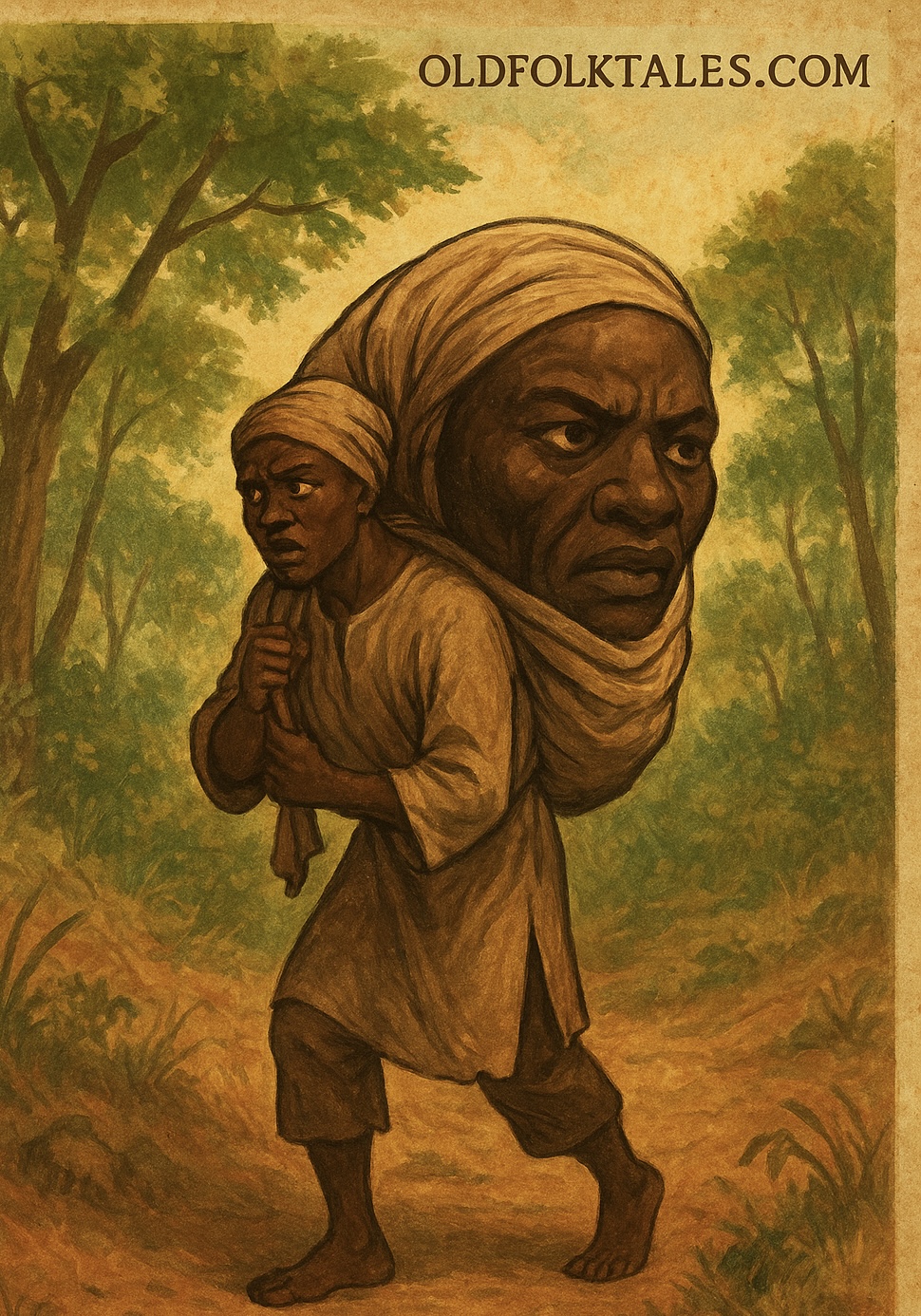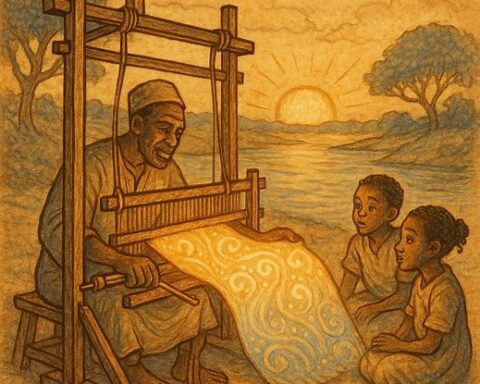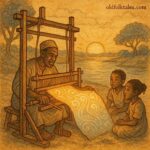In the land of the Wolof people, there once lived a man who loved nothing more than to boast. He was tall, broad-shouldered, and carried weapons wherever he went. When he walked through the bush, he often shouted, “I fear no man, no beast, and no spirit. My weapons make me stronger than any enemy.”
The villagers heard his words and shook their heads. They warned him not to speak with such arrogance, but he ignored them. His heart was swollen with pride, and his tongue could not stop praising himself.
One hot afternoon, as he marched proudly through the forest, something strange happened. The ground trembled, and suddenly a human head rose from the earth. Its eyes glowed like fire, and its mouth opened slowly. “Oh…bot…” it murmured, using the word of infants, meaning it wished to be carried on his back like a child wrapped in cloth.
The man laughed and sneered. “I carry no one. I am the strongest man alive.”
But before he could take another step, the head shot into the sky like a bird and crashed down upon him with terrible weight. He fell to his knees, gasping for air.
“Carry me,” the head commanded in a thunderous voice.
Terrified, the man obeyed. He tore a strip of cloth, wrapped the heavy head, and tied it upon his back like an infant. His pride was gone, replaced by fear. Still, he thought, “I will endure this. I am going to see my fiancée’s family. Perhaps I can leave it there.”
When he arrived at the compound, his fiancée’s relatives welcomed him warmly. They prepared a feast in his honor. The man, pretending all was well, placed the head quietly in a corner and sat with the others. Plates of rice, fish, and sauces were brought to the guests.
But before anyone could eat, the head spoke. “Give me!” it demanded.
The man trembled and quickly passed the head a dish. It devoured everything in an instant. Again, it cried, “Give me!” Another dish vanished into its mouth. The family watched in shock as the visitor’s food disappeared again and again.
Still, the head hungered. The man fetched bran mash and filled one calabash after another, but nothing could satisfy it. The relatives whispered among themselves, uneasy at the strange sight.
That night, when all had gone to bed, the head stirred once more. “Take me outside,” it said. The man obeyed, carrying it into the dark night.
“Now, take me to the mosque,” it demanded.
The man shook his head. “I cannot. That is the sacred place of prayer. I will not profane it.”
But the head grew heavy, so heavy that he fell to the ground, pinned beneath it. “Take me,” it thundered again. At last, broken and fearful, the man carried it into the mosque. There the head rolled itself into the seat of the grand marabout, the most respected holy man, and defiled it with filth. When it was done, it returned to the man’s hut and slept.
At dawn, the worshippers entered the mosque. To their horror, they found the grand marabout covered in disgrace. Anger swept through the village like fire.
The next day all the people gathered in the square. The man came as well, the head hidden once again upon his back.
“Who has committed this abomination?” the crowd cried.
The head whispered into the man’s ear. “Confess yourself.”
Terrified, the man’s knees shook. His voice broke as he admitted, “It was I.”
The people roared with fury. They beat him with sticks and stones and drove him from the village in shame.
At last, weak and broken, the man heard the voice of the head once more. “Return me to the place where you found me.”
He carried it back to the forest. There, the head slipped from his cloth and settled again into the earth. Before vanishing, it returned his weapons and spoke a final warning.
“Remember me when next you boast. Pride will only lead you to ruin.”
Then the earth closed, and the man was left alone, trembling and humbled, with the echo of its words forever in his memory.
Moral Lesson of The Head
The Wolof folktale of The Head teaches that pride and arrogance can bring about one’s downfall. The man believed he was stronger than man, beast, or spirit, yet a single head from the earth crushed his spirit and disgraced him before his community. True strength lies not in weapons or words of boasting but in humility and respect for others. The story reminds us that pride blinds people, while humility keeps them safe.
Knowledge Check on The Head
What is the main lesson from the Wolof folktale The Head?
The main lesson is that pride and arrogance can lead to shame and downfall, while humility ensures safety.Why did the head demand to be carried like an infant in The Head?
It was a test of the man’s pride, forcing him into submission despite his boast of fearing nothing.How did the head punish the man in The Head?
The head forced him into humiliating acts, including defiling the mosque, which led to his disgrace before the villagers.What role did the man’s boasting play in the story of The Head?
His constant boasting attracted the spirit, showing that arrogance invites destruction.How did the villagers react when they discovered the mosque had been defiled in The Head?
They were outraged, gathered in anger, and punished the man after he confessed.What does the ending of The Head reveal about Wolof cultural values?
It shows that humility and respect are valued, while pride and disrespect for sacred places bring dishonor.Cultural Origin
This tale comes from the Wolof people of Senegal, West Africa, who use folktales to teach lessons about morality, respect, and humility.






